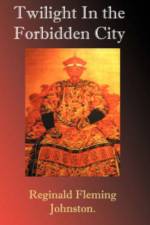av Sir Reginald Fleming Johnston
405,-
As part of China's 2008 Olympic welcome to visitors Xiaomina Press, presents this book about the last emperor of China. This book is essential reading for all visitors to China The Author Sir Reginald Fleming Johnston was a Scottish diplomat and the tutor of Puyi, the last emperor of China. Johnston was eye witness Chinese events in the crucial years of the 1920s and 1930s. Johnston was the only foreigner in history to be allowed inside the inner court of the Qing Dynasty. The author carried high imperial titles and lived in both the Forbidden City and the New Summer Palace. In 1934, Johnston looked for a residence in Scotland to retire to. He found a house on Eilean Righ, a small island in Loch Craignish, some 9 miles (15 km) NW of Lochgilphead. He moved there with his enormous library, which included a Chinese Encylopaedia in 1734 volumes and a complete collection of Buddhist scriptures in 1500 volumes. Twilight in the Forbidden City is very much a history of an entire period and not an exclusive portrait of the last Emperor of China. Twilight in the Forbidden City is prefaced by the Emperor Hsüan-T'ung himself in the year 1931 Chosen by Dowager Empress Cixi while on her deathbed, Puyi ascended the throne at age 2 years 10 months in December 1908 following his uncle's death on November 14. Puyi's introduction to emperorship began when palace officials arrived at his family household to take him. Puyi screamed and resisted as the officials ordered the eunuchs to pick him up. His wet-nurse, Wen-Chao Wang, was the only one who could console him, and therefore accompanied Puyi to the Forbidden City. Puyi would not see his real mother again for six years. Puyi's upbringing was hardly conducive to the raising of a healthy, well-balanced child. Overnight, he was treated as a god and unable to behave as a child. The adults in his life, save his wet-nurse Mrs. Wang, were all strangers, remote, distant, and unable to discipline him. Wherever he went, grown men would kneel to the floor in a ritual kow-tow, averting their eyes until he passed.

